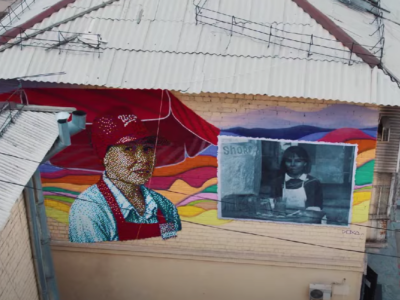See Global Voices special coverage page on the South Ossetia crisis.
Yesterday, the Russian radio station Echo Moscow reported that two Georgian journalists, Alexander Klimchuk and Grigol Chikhladze, were found dead in a street of Tskhinvali, the capital of the embattled region of South Ossetia, and that several others had been wounded. Russophone bloggers wrote about their killing, and Dean C.K. Cox posted a report from the Russian daily Kommersant on the LightStalkers forum:
Two journalists were killed and eight wounded in three days of fighting in South Ossetia.
[…] A group of journalists, including Alexander Klimchuk, the owner of Georgia’s sole independent photo agency Caucasus Press Images, who worked under the contract with ITAR-TASS, his colleague Teimuraz Kikuradze, Grigol Chikhladze from Newsweek Russia, as well as the U.S. reporter Winston Faderly, had disappeared in South Ossetia’s capital Tskhinvali far back on Friday. The news on their destiny emerged only yesterday. Klimchuk and Chikhladze were killed, other journalists were wounded.
According to Caucasus Press Images, Klimchuk and Chikhladze had been in South Ossetia even before the start of Georgia’s assault. In time of street fighting in Tskhinvali, they were in the area first controlled by the Georgians and then by the Ossetians.
[…]Other journalists are in Tskhinvali and the condition of Faderly is rather grave.
Russia’s reporters – a film crew of Vesti TV Channel of Alexander Sladkov, Leonid Losev and Igor Uklein, as well as Komsomolskaya Pravda reporter Alexander Kots – survived the fire Saturday. They were moving in column of armored vehicles led by the 58th Army Commander General-Lieutenant Anatoly Khrulev when attacked by officers of Georgian riot unit positioned two levels above, at the height of 80 meters and 120 meters.
[…] NTV producer Pyotr Gassiev was also wounded in Tskhinvali, news agencies reported past night.
Meanwhile, foreigners are being evacuated from Georgia. “Not because it's not safe, but because we can't do very much work at the moment”, wrote Tbilisi-based blogger Wu Wei.
Zygmunt Dzieciolowski, a Polish journalist in Georgia with a grant from the Pulitzer Center on Crisis Reporting, described his evacuation at the Untold Stories blog:
This morning foreign embassies began evacuating their citizens from Georgia, having decided that the situation here is too unpredictable and that foreign nationals should leave.
Some European countries sent their own aircraft to Tbilisi to retrieve their citizens but the majority are organizing vehicle convoys to the Armenian capital of Yerevan, three hours south. The rules are strict. Only passport holders of those countries which organize convoys can board their buses: The U.S. embassy takes care of Americans, the Polish Embassy Poles (and also the citizens of some friendly European nations represented by Poles in Georgia, like Estonia and Slovakia).
[…]
When we came we felt some tension, but the tension is always here. At the beginning of our trip we had plenty of time for detailed discussions with politicians, journalists, military and simple people. Now I am headed home, and hopefully from there on to Moscow, in the meantime thinking of all that has happened in a few short days to produce the situation of our departure, in an humanitarian evacuation convoy.
The Caucasian Knot, quoting Regional Reporters, reported that that 1,200 Armenian tourists vacationing in the Black Sea resorts of Batumi and Kobuleti have been evacuated from Georgia as well.
Asier Blas, a Spanish political scientist currently in Tbilisi, has been blogging about the situation he's experiencing in Georgia. In his blog Cartas del Este [Spanish] he wrote about last night's rally in Tbilisi, describing his fears at the escalating conflict:
Cuando ya dormía, aproximadamente a las 04:30 am nos despertaron las bombas que cayeron en Tbilisi. Nos agolpamos tres personas en la terraza, la noche, el susto de despertarse con sonidos de bombas y el miedo, hicieron que nuestras miradas por un momento se cruzasen envueltas en pánico. Un minuto mas tarde comenta Nadine que no nos preocupemos, “es lo mismo que la noche anterior, no es en el centro y lo único que buscan es crear miedo”. Estamos de acuerdo los tres, pero las guerras se saben como empiezan pero no como acaban. Es urgente que cese el fuego definitivamente, hoy lunes parece que puede ser posible, confiemos en ello.
While I was sleeping, approximately at 04:30 am we were woken up by the bombs falling on Tbilisi. The three of us run to the terrace and the night, the scare of waking up to the sound of bombs and the fear made us glance at each other in panic. A minute later Nadine told us not to worry, “it's the same as last night, it's not in the center and the only thing they're trying to do is create fear”. The three of us agreed, but wars are something that you know how it starts but not how it ends. A definite ceasefire is urgent, and today Monday it seems possible, let's hope so.







4 comments
Georgia War Crisis…
Soldiers run near a blazing apartment after a bombardment in the town of Gori, 80 km (50 miles) from Tbilisi, August 9, 2008. REUTERS/David Mdzinarishvili (GEORGIA)
Miscalculated.
One word which sums up the military offensive launched by Georgia agains…
Russia-vs-Georgia – new website.
There is a voting and a lot of comments about war in South Osetia
http://www.russia-vs-georgia.com/
The BP run BTC pipeline is the only valuable item in Georgia, the only thing to fight over, and just 2 weeks ago, the promise of it being filled with Kazakh oil disappeared. And it disappeared into Russia’s hands. Within a week the pipeline was blown up, and the Georgian offensive started.
http://morris108.wordpress.com/2008/08/16/immediately-after-us-losing-control-of-central-asian-gas-and-oil-bp-run-btc-pipeline-is-blown-up-war-provoked-in-georgia/
This Post shows the evidence to support that.